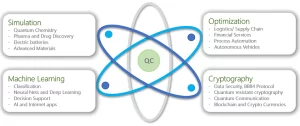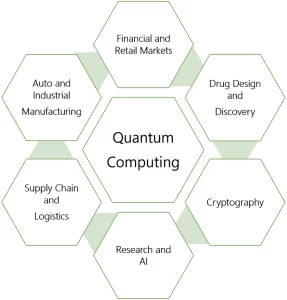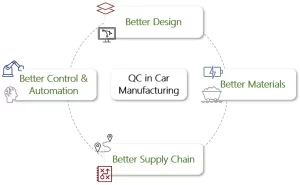Quantum Computing in Car Manufacturing
Quantum Computing is not just a buzzword any more. It is one of the most rapidly developing technologies in the world. Computers, which now pervade every aspect of our lives – from farming to space exploration, are built on silicon architectures developed almost 70 years ago. As computers were getting faster and more capable, the brightest minds in the world were thinking far ahead – of using quantum mechanics to create computing machines.
Development of quantum architectures from their theoretical background is an exciting story and sure deserves its own limelight. In this article, we are going to look at the current and future applications of this technology as it looks to disrupt the car manufacturing industry.
The Power of Quantum
At the base of every computer is a chip densely packed with transistors (around a billion of them in a single square inch!) which work on the binary logic — 1 → for the voltage signal and 0 → for no signal. The values of 0s and 1s are stored in bits. The classical bits – as they are called now, are deterministic and show a singular state at a point.
The power of quantum computers over classical computers comes from the concept of a ‘Qubit’ – their lowest computational unit. The number of qubits in a quantum machine is a major determinant of the number of states you can model in your machine. There is a similarity between our classical computers and quantum computers in the way of representing large numbers. For example – 2n bits, where ‘n’ is any natural number. The advantage of qubits comes from the ability to access all the states at once, as opposed to just one state with the classical bit. So potentially with a quantum computer that has a stable set of 285 qubits, nothing should stop you from modelling the entire Universe!
Applications
The enormous potential of quantum computers over the classical counterparts, as seen previously, has opened a number of discussions about the application areas where current computing has reached its limit. Lot of research is geared to uncover new capabilities previously unknown because of the computing power. The applications of quantum computing generally fall into three types of algorithms.
We can see that nearly every industry uses these four type of algorithms. This brings us to another view of quantum technology by the industry type:
QC in Auto Manufacturing
Quantum Computing (QC) has certain undeniable step ups compared to classical computing used in the manufacturing industries.
- Exponentially higher computing power– Quantum algorithms developed to run on quantum machines will offer exponentially more states which can be modeled, translated straight into higher computing power and speed-ups over current methods
- Innovation advantages – The manufacturing sector is ripe for receiving benefits through the virtuous loop between areas like material discovery, product development, and process optimization. These areas will also show some of the most innovative solutions across all QC applications.
- Impact of early investments – QC, although a major investment for today’s manufacturing, will show a greater impact over the years in all of its application areas
QC in car manufacturing can be categorized in the following ways:
- Optimization: Car manufacturing today consists of a very complex set of processes and relies heavily on classical algorithms for optimizing manufacturing processes, autonomous fleet, robots, and many more. Many such optimization problems cannot be solved efficiently by current methods. With the help of quantum algorithms, the processes could be truly optimized. The manufacturing giant ABB has looked into quantum computing as a way to optimize industrial manufacturing processes.
- Self-driving cars: Cars and automobiles today have millions of lines of code, sometimes more complex than the Boeing 787s, and it is not by accident. Once they hit the mainstream market, autonomous cars are expected to generate up to 5 TB/ hour of data, making it extremely complex even for current supercomputer level machines to simulate and optimize vehicle routing, data processing, and machine learning that goes with the autonomous systems. Quantum computing may prove useful in these scenarios in terms of faster optimization algorithms and faster output from machine learning systems.
- Data security: The cars today are called ‘data centres’ on wheels’ as they generate enormous amounts of data through the engine, sensors, cameras, and consoles. The data security protocols in car manufacturing are fast approaching to be an area of concern, especially after the arrival of 5G technologies in self-driving cars. Currently, the widespread security scheme RSA is shown to come under threat and the industry is looking for potential replacement schemes or cryptographic algorithms from post-quantum cryptography- a new and exciting branch of applications.
Better Materials
- Material science: Present classical computers are not efficient in simulating materials through molecular structure, mainly due to the sheer size of the state space-the exponentially high number of states needed to be captured. Quantum computers are thought to offer help with their ability to do so, leading to discoveries of new materials through modelling and simulation. Quantum material simulation will also help accurately model materials/ processes occurring in nature such as silk fibres, chlorophyll, fertilizers, and others to ultimately yield two different types of interesting scenarios for the manufacturing industries:
- creating stronger, lighter, and faster components with better materials
- discovering and creating new materials previously unknown, through accurately modeled processes and molecules.
- Battery materials: Batteries inside our cars, whether electric or not, remain one of the least understood essential parts. If we are able to model the molecular level interactions using quantum computing power, we could be looking at another major efficiency unlock and perhaps a new revolution in mobility. Well-known car manufacturers such as Daimler are working closely with quantum computing houses and academia to achieve this and help solve some bigger, truly green energy challenges the world is facing right now.
Better Design
- Finite element analysis/ Structural analysis: Mechanical designs today use a number of numerical algorithms to solve for parameters using differential equations. These equations are difficult or time-consuming to solve with current methods, where the use of quantum computers could possibly change the course of design, yielding better designed or printed materials for car parts.
Better Supply Chain
- Logistics / Network modeling and risk analysis: One of the first applications for QC was in logistics and supply chain. Global trade and supply networks are extremely complex and heavily rely on sequentially solving optimization problems. This could be improved many folds with the help of quantum algorithms running on quantum annealers or universal quantum computers. In the auto manufacturing business, there are several applications on different scales, such as:
- direct shop floor tool routing
- traffic routing
- resource, cost, and scheduling
- efficient material flow
- large supply problems such as travelling salesman (TSP) and beyond.
Next Steps
Quantum computing in the future will be relevant in all high-end computational fields, and auto manufacturing is a prime example of it. With quantum computing, there are efficiencies to be achieved and new discoveries to be made, perhaps towards a much leaner and sustainable planet for our future generations. Simply put, here are some ways manufacturing industries can get involved in 2022:
- Find use cases in your industry, plant, or shop
- Partner with a quantum ecosystem of hardware companies, academia, and consulting
- Create and foster the quantum-ready mindset within the organization
Exciting Use Cases
The collaboration between manufacturing companies, quantum hardware/ software companies, and academia have already started. This gives a good glimpse of that in the case of auto manufacturing:
- D-Wave and DENSO Corp – collaboration on a project achieving 15% more efficiency in routing optimization for automated guided vehicles.
- IBM Quantum and Daimler – Finding new pathways through quantum simulation algorithms for better battery designs in automobiles
- D-Wave and Volkswagen – Created an Android app for real-time routing of buses at a conference, using quantum web services running route optimization algorithms, achieving 162 trips, 1257 tasks, and completion of the project objectives. In the second project, the quantum optimization algorithm was used in a paint assembly line to minimize painting workflow disruptions and switches.
- IBM and ExxonMobil – Exploring maritime inventory routing, which could be further extended to routing optimization problems in goods delivery, ride-sharing services, or waste management.
- IBM and Mitsubishi Chemicals: Using quantum simulation algorithms for quantitatively correct computational results of complicated chemical reactions in the discharge process of the lithium-oxygen batteries.
- IonQ, QC Ware, and Goldman Sachs – Designing quantum algorithms intended to let firms evaluate risk and simulate prices for a variety of financial instruments at far greater speeds than the classical algorithms.









Leave a Comment